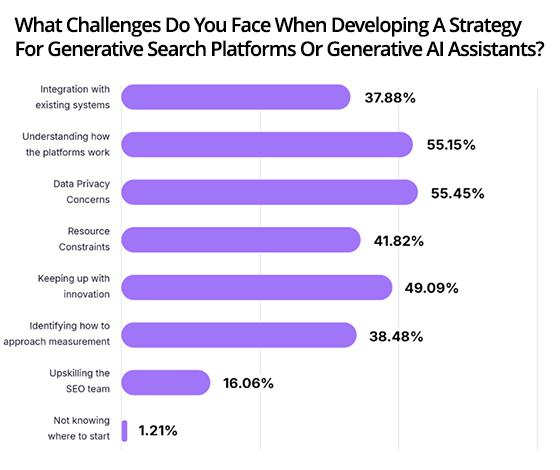
Marketers are not “afraid” of an expanding search
landscape. Ninety-four percent who participated in a recent study said they feel at least “somewhat” prepared to optimize their brands for AI search, and 42% consider themselves
“very” prepared.
Nearly zero respondents reported feeling totally unprepared -- indicating that brands are already planning for the future of search, according to results from a
study published this week. But there is plenty of uncertainty going around on a variety of topics.
The results from Botify's survey of 300 director-level and higher marketing leaders
across the retail, ecommerce, tourism, and hospitality industries tells the story of how AI-powered search is beginning to take hold, where there’s still opportunity, and where there's work to
be done.
Botify partnered with market research solution Centiment to survey marketing department leaders in the United States. The study was fielded between December 2 and December 10,
2024.
advertisement
advertisement
As of January 2025, online search engine Bing accounted for 12.23% of the global desktop search market, while Google had a share of around 78.83%. Yahoo's market share was 3.07%,
according to data from Statista.
How has AI changed marketing teams and
search — organic and paid — and what does it mean to incorporate these goals and strategies into campaigns?
For starters, there is uncertainty around executing new search
strategies.
Despite an apparent enthusiasm for change, marketing leaders are realistic about the challenges new AI search strategies will pose. Some 55% are concerned about data privacy, 55%
say they need to understand how the platforms work, and 49% are worried about keeping up with the pace of innovation.
Only 16% are concerned about “upskilling their SEO teams.”
Some other concerns include Getting websites and top content crawled, rendered, indexed, and shared with consumers in search.
Testing, learning, and iterating on what works via solutions
like SEO split testing, making optimizations at scale, preferably via automated and AI-powered SEO solutions, and analyzing technical data from sources like a website’s log
files to understand AI crawler bots and optimize for them.
Measuring the impact of AI search is also a concern. There is no “source of truth” yet for AI search performance
across all the platforms in a decentralized world.
The report recognized that marketers know they will have to rethink how they measure impact.
Some 56.67% still want to know what the
advantages AI search has compared with a traditional search engine.
AI platforms like ChatGPT Search, Perplexity, Mistral’s le Chat, and others like DeepSeek give consumers a choice on
where and how to search for what they want. This is called “decentralized search,” and marketers need to prepare for how it’s changing consumer behavior.
When asked what
comes to mind for non-Google search engines, 56% of marketing respondents think of ChatGPT, 40% think of TikTok, while only 31% think of Bing. This is an increasingly complex ecosystem. One thing to
remember is that consumers will not stop searching. They will just search in different ways and placed, and marketers must know where to follow them with ads.
More than 62% of respondents said
they are diversifying or adjusting their search strategies to address new search options, while 31.61% plan to do the same.
Perplexity’s AI shopping assistant is an interesting
development in ecommerce when it comes to AI search. Some 54% believe this kind of tool will redefine how they interact with customers, with 35% stating it will enhance certain aspects of the customer
journey.
Technically, marketers seem confident in their ability to monitor AI crawler bot behavior on their websites. Fifty-three percent report they are monitoring AI bot crawling on an
ongoing basis, while another 32% verify the behavior without monitoring it continuously.
Some 40% report that they know the exact percentage of website traffic from bots, while 51% state that
they have a general idea. Leaders are likely using various methods to measure this, Botify said it knowns analyzing log file data provides the most accurate insight into AI bot traffic to a
website.